Once called a sonic wonderkid by Time Out, American singer, songwriter Joe Driscoll had a successful music career in Europe when he decided to move back to the US to support the Bernie Sanders campaign. Now he serves as a District Councillor on the Common Council in Syracuse, New York. He talks to Cooperative City about his journey from beatboxing to politics, the skills sets he uses in politics from his musician background, as well as the discomforts of moving from activism to city legislation.
How did you get involved with the Bernie Sanders campaign?
I moved back to the USA from Europe where I was playing in a musical project with Sekou Kouyate. I was very involved with it but at the time we had some issues, I missed my family. My father was terminally ill. I moved back to the States in 2015. I was always a fan of Bernie Sanders and when he announced to run for president I saw that lot of my musician friends were posting all these Bernie memes. I realised that if I threw a big fundraiser we could raise a lot of money for Bernie. The idea became reality when we booked out one of the biggest theatres in Syracuse, NY and raised over USD 25,000. Originally I just wanted to write a cheque for Bernie but due to some bad advice received by a lawyer, I filed as a PAC (political action committee) and PACs aren’t allowed to coordinate with the campaign. So I had to find a way to spend this USD 25,000 in the most effective way possible to help Bernie.
So I got an office space downtown and we started a group called Syracuse for Sanders, printing bumper stickers, long signs, doing ad campaigns covering the sides of buses. Very grassroots and with no connection to Bernie’s campaign. At the time some of my old friends were working for his campaign so they asked me to open for him with my music. There, I also got to speak about why I was involved, why I was dedicating all my time to him and I got to meet him briefly.
Why did you decide to run for a councillor seat and what do you think made you win?
After the Bernie support gig the organisers told me I was really good at grassroots activism and I should consider getting involved with the Democratic Party and maybe run for office or at least help with campaigns. My local elected official was termed out so it was fortuitous. I don’t think I would have wanted to challenge a sitting representative unless I really disliked them. As that window opened up I figured I would run. So I ran in 2017, just two years after I moved back to the USA. After seeing Trump rise to power I figured the ‘war is on’ and I have to step up and go from the activist movement into joining the battle and getting involved in politics directly.
One of the interesting things I think about is that when I met with the head of the Democratic Party I said to him that the progressives are seriously disappointed with the Democratic Party. He said “Right back at you!” The Democratic Party is disappointed in progressives because all of us, passionate organisers, have moved to the Green Party or outside the democratic system and he said “We need your help if you want to change the system.”
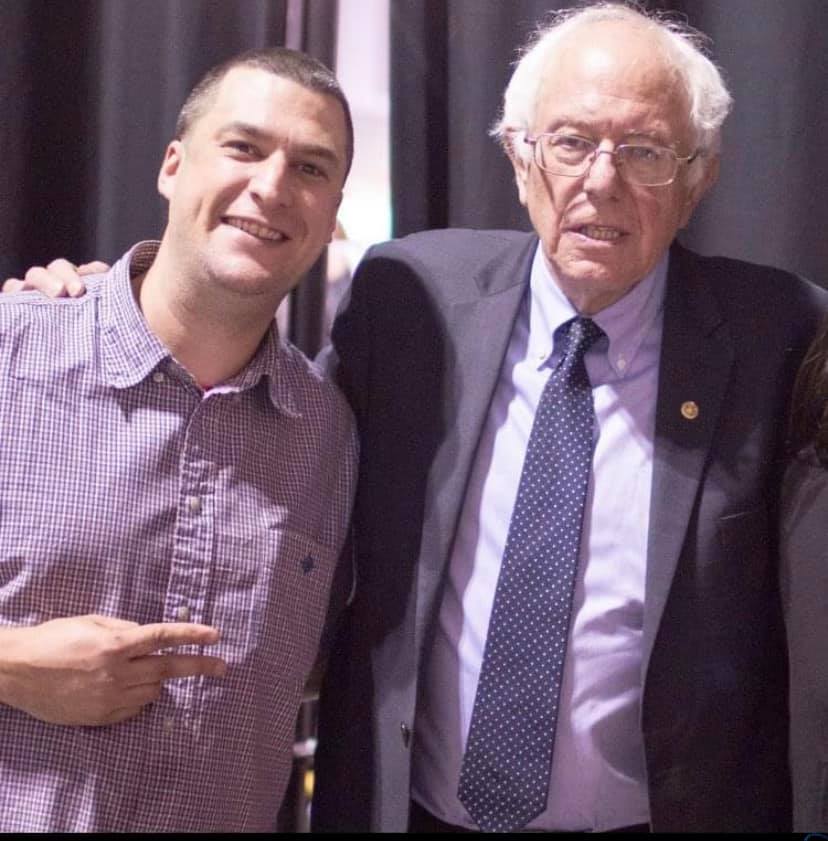
My campaign and my move to office ended up having very little resistance. I ended up having no opponent. I had masses of support from the grassroots community (I had done environmental activism for years and years) and was just coming off the Bernie Sanders movement organising tons of people doing door to door canvassing, and these people were all really excited for me. I started bringing the sound system to all their events, started organising events with them, trying to bring the grassroots energy to the party.
Following on what the head of the Democratic Party said I saw the situation as a peacemaker who doesn’t make peace with his friends but with people he has problems with. I saw that the Democratic Party wanted my help. They were very behind me. I ended up becoming the City Chair of the Democratic Party a year after I came into office. I never wanted to be part of the Democratic Party machine, I was always a Ralph Nader (Green Party) supporter but I saw that the Republican army is massive and super well-organised.
I read the book Dark Money by Jane Mayer and saw how much money they had and realised we have to engage with the other, we can’t start an army with 2% of the population. Bernie and Ralph Nader from the Green Party ran on pretty similar issues: green infrastructure, single-parent health care, progressive taxation of the wealthy. Bernie got inches from presidency while Nader got less than 5%. To me it was like “This is it.” If everyone in America who felt the way I felt went to work for their local Democratic Party and tried to take over or at least exert influence over the party, we could then have a much clearer path to victory than trying to start a separate party. I know in Europe there are multiple parties. Here we have this duopoly. As contradictory it may seem but as Chomsky said, in to order to break out of the cage you need a bigger cage. If we are to break this dynamic, we first need to get some electoral victories, change some legislation. The path seems much clearer through the Democratic Party rather than working against them when the Republican Party is so powerful.
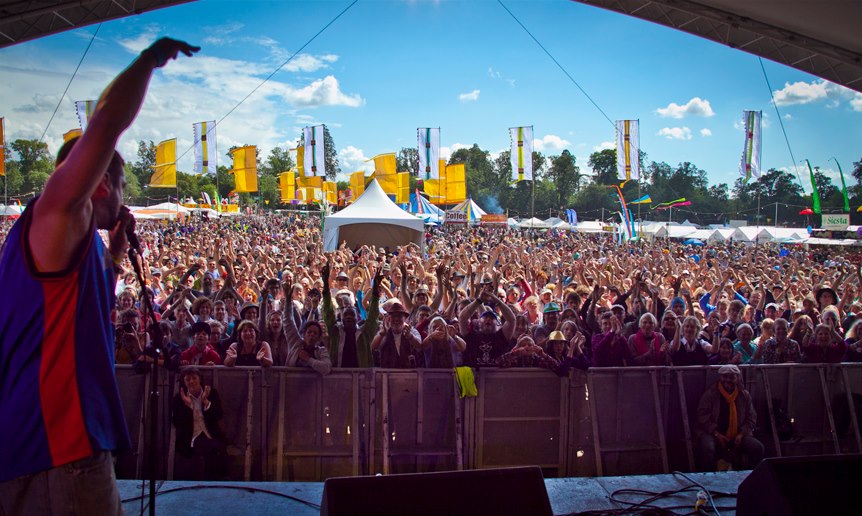
What are the main issues you address in office?
The one thing that fired me up really is lead poisoning. 11% of children in the city of Syracuse suffer from lead poisoning which can cause permanent brain damage, development problems and behavioural problems. It mostly comes from the lead paint in the houses breaking down over time. It is a solvable problem. I read up on how other cities solved this and how a city only two hours from Syracuse implemented a really effective programme. So I knew there were things you could do politically to change the dynamics around this. It became a big priority for me. We did a major study to create the presumption of lead. If a house is built before 1978 and it has paint chipping, most probably it has lead. Since I became a councillor, we passed the legislation allowing inspectors to test homes for lead paint and issue violations when they find it.
Also renewable energy – figuring out, realising the amount of lobbying power. The money I raised was from donors of USD 50 to USD 100 but when you fight big oil money it is harder to change the laws. I wanted to get in and change the lead dynamics and environmental issues. In Syracuse we also have a lot of issues around inequality and segregation. That was very contradictory to my experience of the city from when I was growing up, so to hear that Syracuse had a massive problem of segregation and has concentrated poverty was hard to hear. That’s not the Syracuse I know and I don’t want to be on the top ten list of most concentrated, segregated poverty lists. I wanted to fight and change that dynamic. These are the issues that motivated me to run and I continue working on them now.
How did you find information on the topics you were working on?
Luckily, I do feel that I am an effective legislator and get a lot done. Lot of people just come up to me and say “I have been working on the lead problem, and I want to educate you.” With many initiatives it is key to admit your ignorance and that has been my strongest skill set, admitting I don’t know stuff. As soon as I got into office a lot of people approached me who were already working in government. I have a “leading from the back” approach, not trying to be the guy running it all. I bring in a lot of smart people and guide the process.
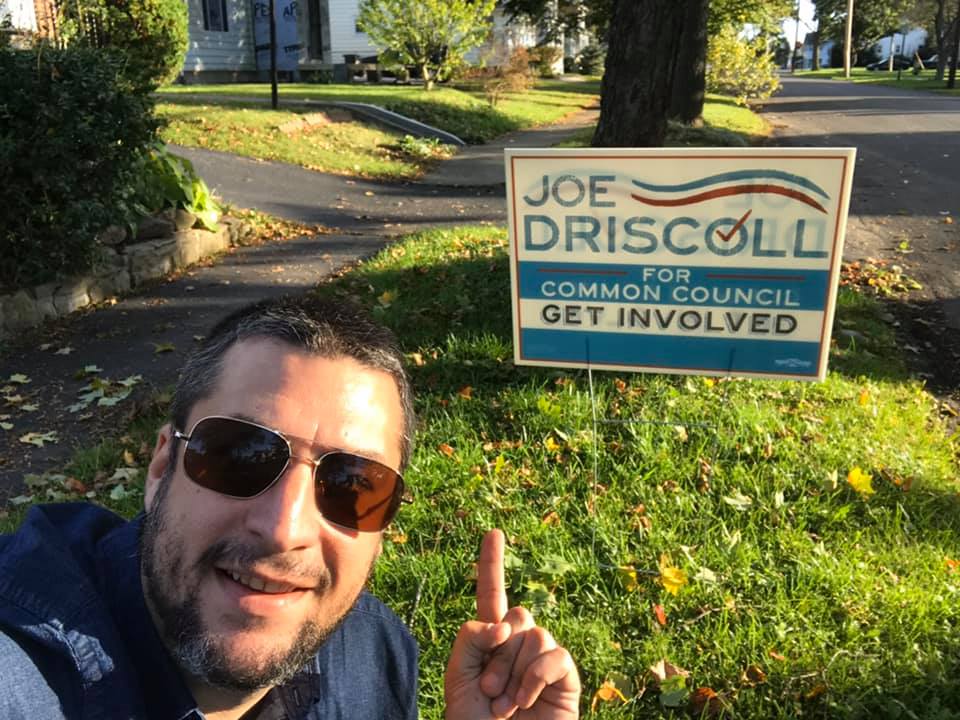
How do other legislators react to you given you had a different path to office from them?
It has been mostly positive. However, when I first got in a lot people said things like “Come and get your banjo and go home!” but I have used social media prolifically in everything that I have done and I feel that enables me to bind with the people. I have a high school diploma, they got education from Cornell or Harvard. My background is 20 years in music and activism. A great skillset is being a conduit rather than being the engine. I am not the engine. The results I get speak for themselves. We got so many things done. We developed a lead ordinance. I kept working with the local, county, state and federal representatives and we got USD 12 million in funding to fight the problems in Syracuse. There are lots of other issues like that.
What skill sets are common between someone in political office and a musician?
I’m someone who doesn’t look for a fight unless I need it. Being a musician and crashing on different people’s couches every night – some conservative, some liberal – you learn to accept people, respect cultures and differences and meet them where they are. That has helped me tremendously. Dialogue, listening and engaging people are skill sets that are very similar to the ones you develop working in music. With writing lyrics, you are concise. You are going around meeting with people. A lot of those skill sets were great training ground for what I am doing now.
How do you engage with the locals?
I go out a lot, we have numerous neighbourhood watch and community meetings. I represent 30,000 people. In many ways it’s a small community. People get to know you. You solve one person’s problem and five learn about it. Social media has been amazing. I posted about free food in the food bank when Covid hit and it went like wildfire through the district among economically challenged residents. People can contact me on Facebook Messenger. They are great tools to get out there.
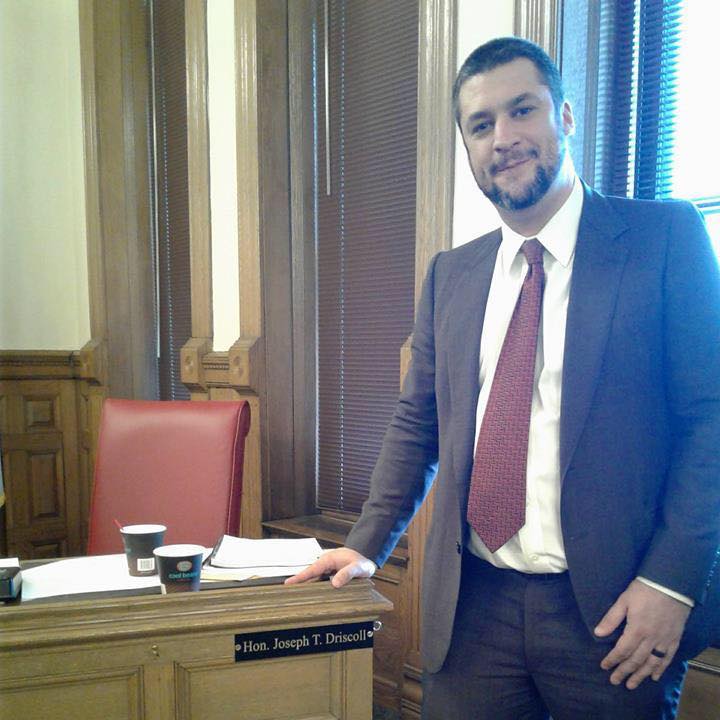
Are there any disadvantages being a legislator as opposed to being an activist?
Absolutely. You have to use diplomacy and euphemisms all the time. You have to temper yourself, not saying what you feel or mean. An activist friend of mine was talking about some great, rebellious acts they had done – spray-painting the side of a building – and I realised I can never take part in that anymore.
The first two terms I ran I did not have a challenger for my seat. The party liked me and the activist community saw me as one of their own. But now the activists are running someone against me. I have an opponent from the left. I always have to think that I might feel about something a certain way but what is practical to get things done? I have to temper what I know to be right with “How can we actually get this done to have impact?”
The police department is a great example. I need to call the police all the time. I need to call the captain weekly to follow up on issues in my district. To go openly on the attack on them, demanding things, that needs to be tempered in order to have a good relationship with them and for them to answer my calls and like me enough to follow through. I can’t be the activist screaming about police accountability when in many ways I am responsible for enacting the law. That’s a hard thing for me. My idealism meeting the practical world.
And now being attacked and called a hack by activists at times hurt. There are some activists for whom the Democratic Party is shit and they are coming after all of them regardless of their achievements. It’s not the way I feel. I make individual calls on what is acceptable and unacceptable and that made me an enemy of those people who view me as a part of the system. But this is what we wanted! I’m one of our own! I’m the Bernie guy! Actually one of the reason I left the City Chair position was because I had to so much pushback from activists. I am focused more on lead and the environment. I dedicate energy to that and I feel rewarded. After being in the party system for two years I am stepping aside a bit. I am still supportive of the Democratic Party but I don’t want to be in the leadership this time.
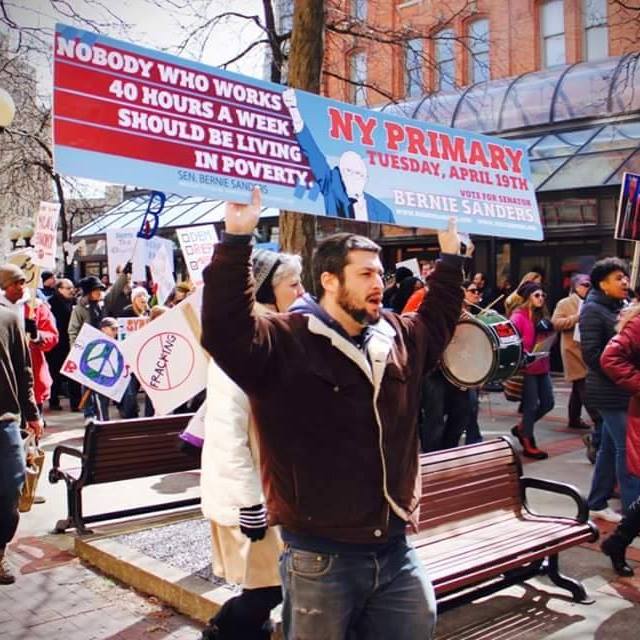
Are you in touch with other cities and scale up or multiply the struggles?
Absolutely. There is a group called Local Progress and they hold conventions. We have a network of elected officials from all the regions and we talk about what we have done in our cities. Also from the Bernie movements that were lots of grassroots organisers who ended up following the same path. There was a crew of us who were organisers for all New York State and we come together a lot. We meet our Buffalo or Rochester counterparts. A lot of it is done on social media as well. We all like each others’ posts on Facebook and follow each other. Most on the work for example I had done on lead was based on the Rochester case. We met legislators from there and found out how they did it so these official and grassroots networks are very useful.
Apart from social media what channels do use to reach out to people?
Working in local government you have the ability to be direct, transparent and upfront with people. Social media has been my biggest, most impactful tool to do outreach. There have also been other networks to tap into. I’m in touch with a lot of political organising groups such as the Indivisible Movement that are more grassroots and I reach out through them. But I do outreach in physical meeting places, going out to events and co-opting a lot of the music community and bringing musicians in the fold. I would throw a lot of fundraising and cultural awareness events, bringing in poets, throwing brunches with foods. Some were ticketed events, renting dining halls or events spaces but also in bars, venues.
The lead group Uplift Syracuse started originally have very good relationships with the unions and so unions would give us their halls free of charge. We would fundraise to provide food which is a really nice addition to the activism and the networks. Let’s have a pizza party and talk about things!
Coming from an Italian family background, food is a symbol of appreciation. So we do a lot of barbecues with DJs. One of the big initiatives I undertook was opening up a community centre in a predominantly African American, economically challenged neighbourhood that the city had forgotten about. We reopened the community centre and raised awareness through donated food and DJs donating their time. We reached out to a lot of people who were populations in those areas. We would spin hip hop and barbecue outside all day. It was so much fun.
What are your future plans?
I would love to run for higher office, State Senate. I believe in timing and serendipity and I don’t really want to challenge people who currently hold those seats. If one of them decided to retire I would run. Being in Covid, calls for defunding the police and activist movements coming against officials I have doubts about what I’m doing. Why fight to the death when it causes much stress and anxiety but I love it. I love the feeling of what the lead legislation represents, to make a difference to people’s lives in a structural way, that is a big addiction. That had you not been there the city might look different.
Any advice for activists who want to get involved with local government?
While activists are disappointed in politicians, the parties are often feeling very attacked, unsupported by activists. Go into it with the concept that you may not know how hard it is to be on the other side of the line. You may not realise the stresses local parties are under. Every elected official has a network system around them. The way I did it at first, before I ran for office, I approached and said “Do you need help with organising this event? I can bring a sound system. I want you guys to support me so I want to support you.” Hold onto your ideals but be aware of the local parties who have been trying to make a change for decades, the reasons why sometimes they don’t work are complex and multifaceted. There are lot of pressures that you are going to learn about on the other side of the fence. Come in with humbleness and pragmatism. The attitude that everyone is incompetent, a sell-out, lazy or they don’t have ideas as brilliant as yours is not the attitude to come into public office with.
Follow Joe’s work and music:
https://www.facebook.com/joedriscollpolitics/
http://www.joedriscollmusic.com/
Interview by Sophie Bod.
Cover image by Antoinette Horace Photography.


